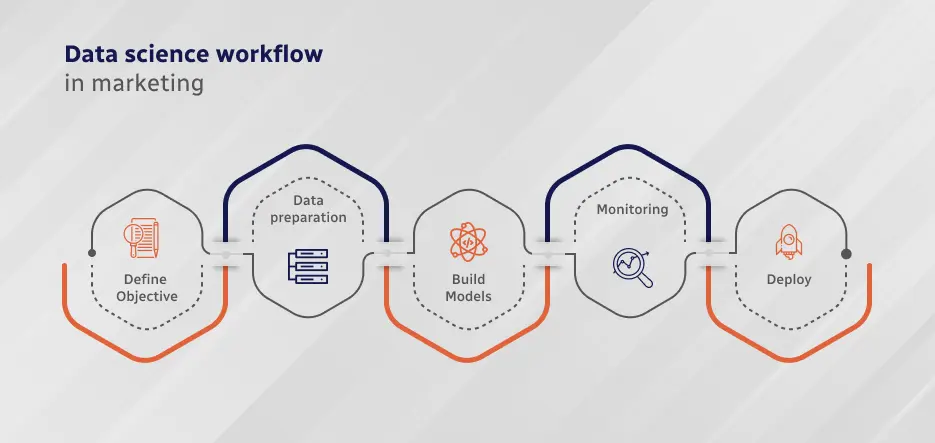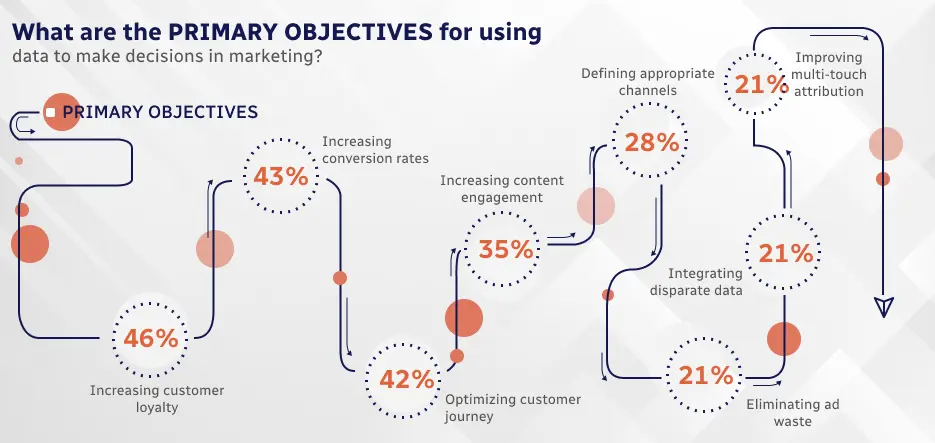Table of Contents
Data science is a part of modern marketing. The business world applies data science solutions in their marketing to help in decision-making with the useful information derived from these huge amounts of data. That means a deep understanding of the client’s needs, desires, and pain areas is the essence of marketing. The tools and methods required to gather, examine, and comprehend consumer behavior are provided by data science and AI solutions.
The areas where data science solutions can help marketing are multifarious. In this blog, we shall discuss how data science helps in understanding customers better and making data-driven decisions. Also, how to execute digital marketing campaigns in the best possible way?
Data science draws from skill areas that include mathematics, sophisticated computing, and data engineering to represent an in-depth, overall view of raw data. Adding marketing data science to your digital drives may sound a bit overwhelming. However, getting deeper insights from your data could be much easier than you think. This is because more businesses are adding AI & ML to their current marketing strategy.
Here’s what you need to know about the role of data science in marketing.

Data science in digital marketing: What Is It?
The majority of the data we had for a long time was little and somewhat organized. It might therefore be examined using basic business intelligence (BI) tools. But things are a little more complicated now. Our data is getting less structured as the corporate environment gets more digitized, and BI solutions are unable to handle the volume and variety of data that we now have.
To derive insights and meaning from unprocessed data, data scientists employ a variety of algorithms, tools, and methodologies that are combined into a forward-thinking, scientific approach. While they are frequently used synonymously, machine learning solutions and data science solutions are not the same. Data science follows the approach of cleaning, preparing, and analyzing big data. Machine learning is a term describing a collection of methods that would let computers learn from data, which are used by a data scientist.
Data science services deal with open-ended questions of “what” and “how” of occurrences. By using this strategy, digital marketers can increase productivity, and enhance automation and decision-making. It will help them gain a deeper understanding of their clientele, and identify patterns in online activity.
Digital marketers can now go beyond one-size-fits-all campaigns and wide demographic targeting with the use of data science. They can anticipate their audience’s demands and habits, comprehend their audience, and create highly customized experiences thanks to it.
Build a Data-Driven Culture and Start Your Data Journey.
How Does Marketing Use Data Science?
Data science drives the marketing industry by simplifying methods for companies to drive data-driven decisions, measure the effectiveness of marketing, and personalized marketing campaigns. You can extract insightful details from large customer data, from the history of their purchase to their interaction on the Internet or social media, with techniques in data science methods such as data analytics solutions, natural language processing, machine learning, and predictive modeling. Let’s examine a few particular uses of data science in marketing:
Segmentation
A marketing strategy called segmentation includes breaking up your client base into smaller segments. Data scientists first gather and examine information on the demographics, behavior, and preferences of their customers before creating customer segments. Web analytics, social media, transactional data, and/or consumer surveys are some of the sources of this information. After that, they divide up their client base into segments by applying machine learning solutions to find trends and commonalities. Usually, predetermined criteria like behavioral data, psychographics, and demographics are used for this. Companies can construct customized and targeted marketing strategies that appeal to particular consumer groups with the help of segmentation.
Clustering
By applying statistical and machine learning solutions, clustering groups customers or items according to common traits, actions, and preferences. Clustering is more exploratory and is done without predetermined criteria, in contrast to consumer segmentation. Unsupervised machine learning is exemplified via clustering. The algorithm is trained on an unlabeled data set with an unknown outcome variable in unsupervised machine-learning models. Finding patterns in the data without the use of a target variable is its aim.
By locating client segments with comparable traits, clustering can help guide segmentation. Marketers can generate more precise and useful client segments by employing this technique.
Finding client categories that are, for instance, more inclined to churn or buy a specific product is made easier with the help of data clustering. Predictive modeling can benefit from this information.
Predictive modeling
The process of developing models that forecast future events based on historical data involves applying statistical solutions. This is known as predictive modeling. Predictive modeling can be used to rank and score leads. They predict customer behavior, value, and preferences, optimizing spending and recommendations.
Optimization of channels
Identifying the best marketing channels to use to connect and interact with target customers is channel optimization. It analyzes consumer behavior, preferences, and engagement metrics across a range of channels. These include social media, display advertising, email, and search engines, are a part of this process.
You may determine which channels are most useful for connecting with your target audience, encouraging interaction, and generating conversions by utilizing machine learning algorithms and sophisticated data solutions.
Customer personas
Accurate buyer persona development depends on the ability to categorize clients based on similar attributes and interests using data science techniques like segmentation and clustering. To further hone buyer personas, predictive modeling can also be utilized to determine the traits of clients who are most likely to become paying clients. More precise customer personas may be produced with data science solutions, allowing you to design extremely successful, individualized, and focused marketing campaigns.
Customization and Focus
Two essential elements of contemporary marketing are personalization and targeting. Enabling these skills is made possible in large part by data science solutions. You can divide up your consumer base according to their demographics, behavior, and other characteristics by using data science services. After that, you may target these consumer categories with offers and communications that are specifically catered to their requirements and areas of discomfort. A variety of platforms, such as site content, email marketing, and targeted marketing campaigns, can be used to distribute these messages.
Recommender Systems
Developing recommender systems is one particular and very successful personalized marketing strategy. Recommender systems make recommendations to users for goods and services based on their past usage and preferences using data science techniques. You may boost conversion rates and spur revenue development by making more pertinent product recommendations. Additional personalization strategies, including dynamic pricing, can further improve client engagement and increase conversion rates.
Cost-Management Plan
Data science solutions are a tool that marketers may use to study consumer buying trends and spot upselling and cross-selling opportunities. You may create product packages and targeted pricing strategies that boost sales and customer loyalty by studying consumer behavior.
Client Loyalty
Using data science services to increase client loyalty is a very successful way to lower churn. You can proactively connect with customers who are at risk of churning, or abandoning the business, by using predictive modeling to identify them. This will allow you to solve their problems and win back their loyalty.
Sentiment analysis
Sentiment analysis is the process of determining and examining the sentiment, or emotion. Particularly that is conveyed in textual data, including blog comments, social network posts, and customer reviews. Sentiment research sheds light on consumers’ opinions on a specific brand or product. Using this data, areas for improvement can be found.
To find patterns and trends in consumer sentiment, data scientists examine vast volumes of unstructured text data. The study of comprehending and interpreting human language is the subject of the data science subfield of natural language processing, or NLP for short. NLP is a subset of artificial intelligence. It is the primary artificial intelligence tool for sentiment analysis. Natural language processing solutions find terms and expressions that link to either a pleasant or negative emotion. Negative sentiments would be words such as “disappointing,” “terrible,” and “awful.” Positive words can be “great“, “amazing“, and “awesome“
Automation
Large-scale automated customer care can be improved by utilizing predictive and sentiment analysis of your customers. For example, companies can teach chatbots to comprehend and reply to client requests by utilizing machine learning and natural language processing techniques. This makes it possible for companies to offer prompt, individualized help, enhancing the general customer experience.
Lead Scoring
A method for determining and ranking the most promising leads is lead scoring. This is achieved by giving each lead a numerical score determined by several variables, including online activity and interaction with marketing materials. If a lead downloads a whitepaper, attends a webinar, or visits your company’s website, they could get a higher score. On the other hand, leads who have unsubscribed from marketing emails or never engage with marketing materials from your company can get a lower score.
With the help of machine learning algorithms and other high-end data analytics tools, it becomes easy to come up with predictive models that then show incredible accuracy in pinpointing key elements affecting conversion. This, therefore, allows one to score leads with higher precision and accuracy.
Analysis of Market Baskets
A data analysis method used by data science solution architects is called market basket analysis is used to find patterns in the links between products that are frequently bought together. “Itemsets” is the term used to describe these product sets. Metrics like lift, confidence, and support are used to quantify how frequently itemsets occur. Support quantifies how frequently a specific itemset appears in a dataset, whereas confidence quantifies the chance that an item will be bought given that another has already been bought. Lift quantifies the extent to which a certain event impacts the occurrence of a subsequent event.
Market basket research information can be used to improve product offers, pricing policies, and advertising efforts. For example, based on the study of regularly purchased items, a store may design bundle deals to entice customers to buy comparable things together. Additionally, cross-selling and upselling opportunities can be found with market basket research. It can also be used to comprehend how price or product offering changes impact consumer behavior.
Analysis of Regression
It tests the relationship between one or more independent variables, such as pricing or digital advertising spending, and a dependent variable like sales. Regression analysis by a data science company gives you insights of changes in the independent variable affecting the dependent one and hence helps in making data-driven decisions across advertising spend, price, and promotions. For example, regression analysis will tell how changes in your ad spend relate to sales and thus be able to adjust the ad budget.
Affinity analysis
The data scientists use statistical models and machine learning algorithms like Apriori, FP-Growth, and the Eclat algorithm for performing affinity analysis. These algorithms identify the links between the frequently occurring item sets by first searching for frequent item sets.
The insights drawn from affinity analysis will help in product assortment optimization, targeted marketing efforts, and improved recommendations. While market basket analysis focuses on purchase behavior, affinity analysis can find the links between a wide range of objects, actions, or occasions.
Social Media Marketing
Data science has extreme importance in social media marketing as it extracts insights from large volumes of data. Data scientists can use machine learning algorithms and natural language processing to make sense of interactions taking place on social media and, therefore, understand patterns in customer behavior and attitude. The insights obtained inform social media tactics on messaging, targeting, and production of content.
The information gathered further allows one to track the performance of social media content and make adjustments that better reach and engage the target audience. You can use data science skills, A/B testing, predictive modeling, and many more data-driven techniques to test and optimize your social media strategy.
This field of data science also enables the measurement of success from these collaborations, finding influencers with complementary audiences, and targeting. It also involves measuring conversion and engagement rates and effects on sentiment and brand recognition.
You can finally leverage data science in the optimization of ad placements, ad structure, and various other factors. This will maximize the effectiveness of your social media campaigns. In this way, you will be able to broadcast the right message at the right time to the target audience. This will lead to an increase in the number of conversions and revenues.
Real-time communication
Data science consulting companies also grant businesses the benefit of knowing how consumers are interacting with your brand in real-time. In a reversibly quick way, using real-time data and analytics allows an organization to adjust its marketing strategies toward a better consumer experience. It builds stronger bonds between customers and a business entity for enhanced engagement and loyalty.
You can integrate data science services into growth experimentation, testing situations, and experiments in real-time, which was not possible by any stretch earlier. The ability to analyze customer sentiment and feedback regarding product or brand features is very critical for modern marketing teams. It helps you customize your campaigns according to the requirements and preferences of your target audience.
The leverage to experiment and optimize in real time is a huge advantage. Especially in today’s quick and highly competitive business environment.
Optimization of marketing budget
You can optimize our budgets in several ways with the use of data science. Predictive modeling is one method. Using this, data scientists come up with insights regarding customer behavior by looking at previous data. Knowing these insights will help you make wiser decisions about how much to spend in each channel. Where you should focus your money for the greatest return on your investment. The response rates may also be looked at to determine through which channels clients can be reached and engaged best. Such data-driven methods of budget optimization can provide you with a best-practice approach to resource management. This makes it more effective and efficient by guiding decisions toward better outcomes.
Product Development
You can develop products that will answer the needs of your customers by determining those features or improvements they most desire to see. This can be done from an analysis of large amounts of customer data.
Data science solutions are also useful in matching your clients with the perfect product. For this to happen, a data engineering company applies multiple clustering analyses, using insights from buyer persona data to infer other products and prices that clients would likely want to buy. It will therefore give a better understanding of exactly what they were looking for.
Let us Build a Data-Driven Future. Connect With The Top Data Science Solutions Company
Data Science Advantages For Digital Marketing
1. Strengthen Customization and Targeting
One of the primary advantages of data science in digital marketing strategy is the improvement of targeting and customization. With access to vast volumes of client data, a digital marketer may properly understand their target audience and segment their customer base based on demographics, behavior, and preferences. Thanks to segmentation, the digital marketer can create highly targeted advertisements that fit specific clientele groups.
When it comes to AI & ML in content marketing, word clouds are usually used by marketers to examine social media interactions. Even yet, word clouds were helpful in situations when there was a lot of social contact.
Marketers tended to utilize irrelevant keywords when social interaction was low. Using data science and natural language processing techniques, they may go beyond word clouds, contextualizing word usage, data visualization, and presenting pertinent information to attract customers.
90% of seasoned marketers think that focused marketing increases profits for their companies, according to a Google marketing poll. With a wealth of client data, you may create highly focused content. Analytics software may forecast clients’ preferences based on their profiles, past purchases, and browsing habits, enhancing the customer experience.
2. Enhance Analytics and Insights for Customers
It is only through the application of data science by data science experts that vast amounts of data will make sense to a business for it to understand its customers better.
By using all sorts of data sources and techniques, digital marketers would get full insight into customer journeys and behaviors. Examples are from website analytics to social media metrics to transactional data. They can identify patterns, trends, and problems with customer service as well as create effective marketing campaigns because of this intelligence.
For example, a hospitality company with the help of data science experts can find areas for improvement and make changes to boost visitor happiness by evaluating customer feedback and sentiment data. This will lead to favorable evaluations, improved loyalty, and recommendations.
3. Identify Useful Channels
Marketers can use data science solutions to determine which channels are best for their campaigns. A digital marketer can use attribution modeling and historical data analysis to determine which channels and touchpoints have the biggest influence on conversions. With this knowledge, they can improve their marketing mix and make prudent resource management decisions.
Through data evaluation, a software-as-a-service (SaaS) company might find, for instance, that its target audience interacts more on LinkedIn than on Twitter. Data science consultants may produce better leads and increase conversion rates by narrowing their target and spending money on LinkedIn ads.
4 Forecasting and Analytics Prediction
With the aid of data science solutions, digital marketers can anticipate customer trends and behavior through the use of forecasting techniques and predictive analytics. Marketers can create a predicted lead scoring system by using data science techniques. Using this method helps your data scientist categorize your lead list based on the likelihood that a lead will convert.
Additionally, data science consulting companies can identify patterns in past data and build predictive models for future outcomes. This supports resource allocation, marketing optimization, and decision-making for digital marketers.
Data visualization and analytics for digital marketing offer companies a competitive advantage. Digital marketers understand business, customers, and the environment within which they operate. The benefits include:
- The application of the insights on the marketing strategy,
- gaining new customers,
- holding existing ones,
- picking out defective marketing campaigns, and focusing on top-selling items.
You may also use web analytics and data visualization tools to learn more about your competitors to stay up to date with the market and better plan for impending challenges and sentiment.
5: Maximize Campaigns and Advertising
Optimization is prioritized by data science in digital marketing and advertising. With actionable insights, digital marketers can optimize the impact and reach of their advertising campaigns and improve their efforts across many platforms.
In case you use the appropriate data science analytics tools to track the success of your marketing efforts in real-time, then there will be more flexibility on the part of your company to adjust the methods and improve campaigns.
This is very important, especially where sponsored marketing campaigns are concerned. In that, it helps you get full value for the money you are putting into advertising. You can use it to determine how consumers are influenced by various marketing channels, whether social media, mobile, or web. Then, inform your marketing campaigns with some other KPIs, such as the volume of your website traffic. This increases efficiency and helps in planning for the future.
Return on investment is critical in the marketing industry. By linking a company’s marketing initiatives to return on investment, data engineering companies support the marketing budget.
6: Make the most of your marketing budget
For digital marketers, budgetary constraints are the primary problem. Every marketing team wants to maximize the return on investment for the funds that have been allotted. However, it’s often not easy to do this. Consuming funds effectively can be difficult when data don’t always line up with the strategy.
One of the main reasons Data Science solutions are important to digital marketers is that it allows them to have overall knowledge of the effectiveness and ROI of every marketing channel and thus fully optimize their budgets. For example, attribution modeling, coupled with the analysis of data, will give a clear understanding of how each channel has contributed to the revenue and conversions.
With this information, top data analytics companies may more effectively allocate resources, increase investment in channels that yield higher returns and modify or remove underperforming channels.
7: Better Customer Service
Because data science solutions allow businesses to offer relevant, customized interactions at every touchpoint, it is essential for enhancing the consumer experience. By merging data from multiple sources, marketing professionals may create tailored experiences that appeal to particular clients. For example, customer feedback, social media, and website engagements.
Recognizing and anticipating consumer behavior patterns will help you target your marketing and advertising efforts to the needs of your target audience and draw them in. Consider email marketing tools as an example. They offer marketing data, like social media likes and shares, to track subscriber responses. Customers become better and more involved as a result.
To provide consumers with a smooth and delightful experience, hotel chains can use data science solutions to personalize offers based on past reservations, client preferences, and information from loyalty programs.

Data Science Use Cases
Today’s business world is fiercely competitive. They depend on the nexus of data science and marketing to achieve long-term growth. Data science services are used by well-known companies let’s take a look at how.
Netflix
Data science solutions are the driving force behind Netflix’s business and marketing strategies. For instance, it makes use of data to customize each user’s content offerings and recommendations. Large volumes of data are gathered by Netflix about the watching preferences, search histories, and other activities of its subscribers. Afterward, data scientists create prediction models and algorithms with this information to assist Netflix in providing each customer with a customized set of suggestions. These ideas consist of customer-specific TV or movie thumbnails, tailored promotional offers, and suggestions for content.
Ultimately, Netflix’s success can be attributed to the way it uses data science in marketing and business to drive development and profitability while simultaneously giving users a highly individualized and engaging experience.
Facebook targets users with appropriate ads based on their demographics, interests, and platform behavior by utilizing data science solutions. It gathers vast quantities of user information, which its algorithms utilize to forecast the kinds of advertisements that users are most likely to interact with.
The platform employs data science solutions to customize news feed content for users and recommend suitable pages and organizations to follow. Facebook can boost engagement and keep users on the site for extended periods by giving them more relevant material.
Through its AdWords platform, which leverages artificial intelligence solutions to optimize ad delivery and enhance ad targeting for advertisers, Google applies data science to marketing. Google creates user profiles and makes predictions about which advertising will be most relevant and engaging for each user. The prediction is based on an enormous amount of data analysis on user activity. It includes searches, website visits, and ad clicks.
Coca-Cola
Over 500 soft drink brands are available worldwide from Coke. Because of the size and complexity of its operations, Coca-Cola creates a significant amount of data along its value chain. It includes source-producing distribution, sales, and consumer feedback. Its entire strategic planning process is based on data science. Coke uses a variety of data science techniques to gather consumer data about its business in addition to its millions of social media admirers.
Optimize your Marketing and Improve Customer Satisfaction With Our Data Science Services
Conclusion
Data science solutions have evolved into the single most important tool in marketing. It enables businesses to tailor their advertising, make data-driven decisions, and max out their spending. It applies machine learning, predictive modeling, and other techniques from data science. Marketers will be better placed to turn insights into customers’ behaviors, preferences, and sentiments. It turns into greater success and more efficient marketing strategies.
Businesses that invest in the advancement of their data science solutions are more likely to stay ahead. As the field of data science in marketing continues to increase in prominence. Ultimately, artificial intelligence, machine learning, and data science have revolutionized digital marketing. Data science is rapidly evolving from a cool, cutting-edge fad to a technology that will soon be required by every SaaS company.
With the help of data engineers and data scientists at A3Logics, one can understand deeply the target audience and gather new, useful insights. After all, it can be pretty expensive to decide to leave data science outside of your marketing plans.
FAQs
How Does Marketing Leverage Data?
“Data-driven marketing” is the term for the process of capturing and then analyzing data. This is to drive marketing decisions and personalize customer experience. From that data—much of which is centered on demographic and behavioral information about consumers—marketers can ensure the right people are reached at the right place and time.
How Might Marketing Leverage Data Science?
Data science can help marketers understand which kind of content their target audience resonates with. When data is analyzed for the performance of content, through the right algorithms, it refines the content strategy, creates more engaging content, and raises the level of user engagement.
Using which algorithms is data science marketing based?
Data science marketing uses sophisticated algorithms such as K-means, hierarchical clustering, and DBSCAN. data science segregates consumers into distinct groups based on various parameters ranging from demographic data to online activities and purchase trends.
How would data enhance marketing?
Data and analytics make one understand the demographics, interests, and habits of a target audience, thereby helping to better realize one’s consumers. You can create more personalized and relevant marketing messages to help connect with your target demographic using this data.






